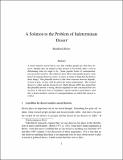A Solution to the Problem of Indeterminate Desert
Author(s)
Skow, Bradford
DownloadSkow_A Solution.pdf (155.7Kb)
OPEN_ACCESS_POLICY
Open Access Policy
Creative Commons Attribution-Noncommercial-Share Alike
Terms of use
Metadata
Show full item recordAbstract
A desert-sensitive moral theory says that whether people get what they deserve, whether they are treated as they deserve to be treated, plays a role in determining what we ought to do. Some popular forms of consequentialism are desert-sensitive. But where do facts about what people deserve come from? If someone deserves a raise, or a kiss, in virtue of what does he deserve those things? One plausible answer is that what someone deserves depends, at least in part, on how well he meets his moral requirements. The wicked deserve to suffer and the decent do not. Shelly Kagan (2006) has argued that this plausible answer is wrong. But his argument for that conclusion does not succeed. I will show how to formulate a desert-sensitive moral theory (and also a desert-sensitive version of consequentialism) on which this answer is correct.
Date issued
2012-06Department
Massachusetts Institute of Technology. Department of Linguistics and PhilosophyJournal
Mind
Publisher
Oxford University Press (OUP)
Citation
Skow, B. “A Solution to the Problem of Indeterminate Desert.” Mind 121.481 (2012): 37–65.
Version: Author's final manuscript
ISSN
0026-4423
1460-2113